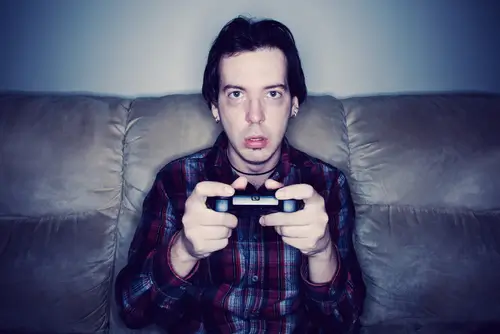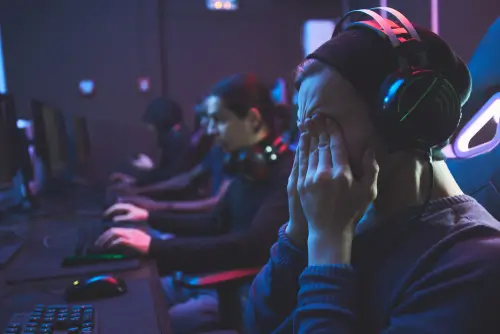Video games played in the home can be traced back to a very basic game called Pong released in 1972. Its simplistic graphics and limited options seem laughable today. Video games now constitute a billion-dollar industry, generating approximately 21.1 billion US dollars in revenue in 2020, with over two billion people worldwide enjoying them. Most people can play video games without negative results. For others, it becomes an addiction. Video games can be played on computers, televisions, and smartphones. The ease of accessibility and the fact that they are portable make the temptation to overindulge in them a real problem. How to stop video game addiction first requires recognizing how dangerous and prevalent it has become.
Video Game Addiction: Is That Even a Thing?
For someone who does not play video games or only enjoys them infrequently, the concept of addiction to them being a risk may seem questionable. While some people can be categorized as engaging in overuse of video gaming, the ability to become addicted to them is quite real.
Playing video games can trigger the release of dopamine in the brain, which allows the person to experience pleasure. This experience shares a commonality with what happens when a person drinks alcohol or uses drugs. When a person has become addicted to this result, loss of time playing video games can result in withdrawal symptoms similar to that of drug and alcohol addiction. This leads to them wondering how to stop video game addiction.
Facts about video gaming can help those who doubt their addictive quality better understand the hold they have on some people. The State of Online Gaming 2020 report showed that:
- Seventy-five percent of households have at least one gamer in them.
- Video game players spend an average of over six hours per week playing games.
- Watching gamers play video games online now surpasses the popularity of watching sports among those aged 18-25.
- Almost 40 percent of gamers aspire to become professionals who support themselves by playing video games.

Signs and Symptoms of Video Game Addiction
Even if a video game addiction or internet gaming disorder isn’t recognized as a formal diagnosis, a compulsive desire to play video games can still cause distress and dysfunction. Using technology, especially playing video games, actually activates the same reward system in our brains as using drugs. In fact, this link is supported by studies on neurobiology. Some people may enjoy playing video games for many hours a week but are not symptomatic of someone with an addiction. Video game addicts exhibit many signs and symptoms that share similarities to drug and alcohol addiction. These can include:
- Prioritizing playing video games above job, family, and school responsibilities
- Neglecting other hobbies and pastimes in order to focus solely or mostly on gaming
- Isolating from family members and friends while playing
- Lying or covering up how often they play games
- Developing medical conditions related to constant gaming, such as eye strain, migraines, and carpal tunnel syndrome
- Experiencing withdrawal symptoms when unable to play video games
- Circumventing parental rules about permission to play games and ignoring screen time limits
- Becoming aggressive when denied the ability to play
- Losing sleep in order to keep playing
- Skipping meals so as to avoid stopping gameplay
- Neglecting hygiene
Why Are Video Games Addicting?
A lot of people have experience with video games that is limited to playing old-school games like Pac-Man or Space Invaders. These games typically were played at video arcades and were the focus of a session of solo time or a group activity with friends. Once the session of game playing was over, most people forgot about it and moved on to another activity. Some of the reasons for video game addiction are:
Escapism
Today’s video games showcase amazing graphics and realistic, 3-D imaging. Similar to when HDTV redefined how rich in appearance television screens could be, modern video games offer a passport to a variety of fantasy worlds. Many players report feeling as if they have actually entered these worlds, leaving their real life behind.
Online Gaming Communities
Multi-player games offer virtual companionship with players around the world. For those who may have trouble developing real-time friendships, this can be difficult to resist. Others may begin to ignore their in-person friendships and romantic relationships in order to devote time to their online gaming community of friends.
Acceptance among the gaming community can be liberating for people who feel like outcasts in the real world. The idea of leaving that community behind affects their self-image and threatens their social standings, as they see them. The draw of feeling like a part of things, especially for someone who may identify as a misfit, can be as strong as the actual desire to play the games themselves.
Reward Systems
Video games often use a reward system that encourages players to continue playing in order to achieve higher levels, unlock new features, or earn virtual currency. This can be particularly addictive for individuals who are motivated by achievements and rewards. These reward systems can be designed in a way that keeps players engaged for long periods of time, leading to potential video game addiction.
Competition
Many video games involve competitive gameplay, which can be a source of motivation and enjoyment for some individuals. However, this can also lead to addiction as players strive to improve their skills and rankings. In recent years, many video games have had a competitive aspect to them with esports becoming more popular. For example, the first-person shooter computer game, Valorant, has exploded in popularity due to its competitive nature.

Seeking Treatment for Video Game Addiction
If you feel concerned for yourself or a loved one and want to know how to stop video game addiction, many options exist. Professional treatment programs, including residential and outpatient ones, often offer help for those with a video gaming addiction. This includes both programs for adults and those for teenagers and adolescents.
Consult with your physician, a licensed counselor, or a treatment program. Many can offer solid advice about if a person seems likely to suffer from gaming addiction and where to turn for help. Getting a video game addiction under control helps a person transition back into healthy hobbies that keep them rooted in the real world.
Treatment Options for Video Game Addiction
There are various treatment options available for individuals who are struggling with video game addiction. While there are no one-size-fits-all treatment programs, here are some of the treatment options available for video game addiction:
- Cognitive-behavioral therapy (CBT): CBT is a type of therapy that helps individuals change their negative thought patterns and behaviors. For video game addiction, CBT can help individuals identify the underlying causes of their addiction, develop coping strategies to deal with triggers and cravings and learn new skills to manage their time and activities.
- Family or group therapy: Family or group therapy can be beneficial for individuals with video game addiction, as it can help improve communication and relationships within the support network. Family members can also learn how to support their loved ones in their recovery process.
- Support groups: Support groups, such as Gamblers Anonymous and Online Gamers Anonymous, can provide a sense of community and support for individuals with video game addiction. These groups offer a safe and non-judgmental space for individuals to share their experiences, receive encouragement from others who are going through similar struggles, and improve their social skills.
- Residential treatment programs: Residential treatment programs offer intensive therapy and support in a structured environment. These programs can be particularly beneficial for individuals with severe video game addiction or co-occurring mental health issues. The treatment programs may offer inpatient or outpatient treatment plans depending on the needs of the individual.
Video Game Addiction Treatment in Los Angeles, California
Launch Centers is a treatment center that provides support and treatment for individuals struggling with video game addiction and any accompanying mental health issues. Our comprehensive approach addresses the underlying causes of addiction and focuses on developing coping skills and healthy habits to support long-term recovery.
Our treatment programs are tailored to each individual’s needs and preferences and may include a combination of therapies such as cognitive-behavioral therapy, family therapy, and group therapy. Our team of addiction specialists, therapists, and medical professionals work together to provide personalized care and support throughout the recovery journey. If you or a loved one is struggling with video game addiction, contact Launch Centers at our Los Angeles program now and find out how we can help today.





